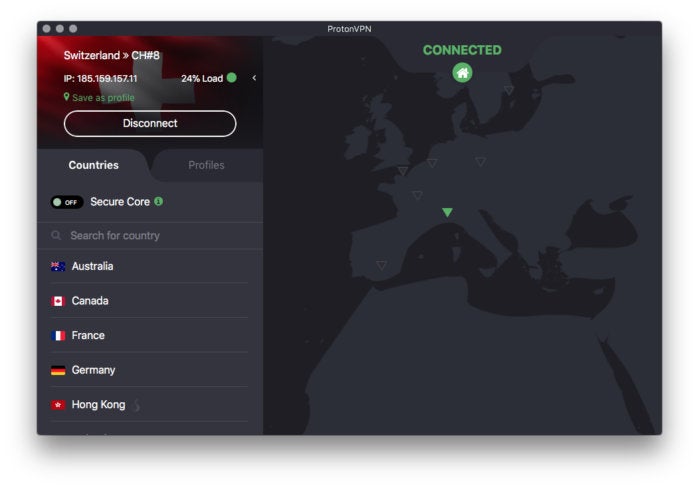Best VPN for Mac 2021: Reviews and buying advice
[ad_1]
With the internet abuzz with privacy concerns and the potential changes coming to net neutrality, you’ve likely heard about virtual private networks, better known as VPNs. When used correctly, a VPN can greatly strengthen your online privacy, assist in keeping your personal information secure, and even spoof your location in the world—allowing you to access websites or services that would otherwise be off limits due to region-locking.
With the increased popularity of VPNs has come an increased number of VPN providers vying for your business. That makes finding the best one to suit your needs difficult. To help you sort out the right provider for you, we’ve committed to extensive research and testing of VPN services that cater to Mac owners.
If nothing but the best will do, check out our routinely updated list of category leaders below.
Updated 5/17/21 to include our review of ProtonVPN. Scroll to the bottom of this article to see links to all of our VPN reviews.
The best VPN services for Mac 2021
If you prefer to do your own shopping, we’ve got your back there, too: Each of the VPNs we test is thoroughly reviewed, allowing you to make an informed decision on which one to throw your money at. See complete summaries of our picks, and our full list of reviews below.
Best VPN overall for Mac
It’s hard not to love NordVPN, and it remains our top pick for Mac users. If your main concern is maintaining privacy and as much anonymity as you can realistically achieve online, NordVPN has gone a long way to improving user trust in 2020. (Read our full review of NordVPN.)
NordVPN offers above-average data encryption to keep their subscribers’ data safe while tunneling. It’s got a large network of servers, too: over 3,000 servers spread across more than 60 countries, allowing you to spoof a wide number of locations and avoid server congestion.
Moreover, its software interface is easy to use, making even new VPN users feel like online-privacy experts. While it’s not perfect, NordVPN gets more right than any of the other VPN providers we’ve tested so far.
Best VPN for security/privacy on a Mac
Mullvad is the ultimate choice for users who want to remain as anonymous as possible online. Mullvad runs its own VPN network and wants to know as little about you as possible. Users don’t supply a name and email address to create an account, and you can even pay in cash if you like. The service’s privacy policy is also top notch. You won’t find any special features such as a promise to work with Netflix. Regardless, anyone who cares about privacy and anonymity should seriously consider Mullvad. (Read our full review of Mullvad.)
Fastest VPN overall for Mac
The latest version of ExpressVPN has by far the best overall connection speeds we’ve seen. Its performance in every major region we tested was excellent including Europe, the U.K., the United States, and Asia. ExpressVPN is expensive for a VPN, but you get a lot of value for that money. If you’re interested in connecting to zippy VPN servers located within the continental United States, ExpressVPN is the one to beat. (Read our full review of ExpressVPN.)
Fastest VPN for other countries
If you are interested in connecting to servers in other countries, we’ve found the following to be fast options:
- UK: TorGuard welcomes P2P file sharing on its VPN servers with open arms and offers the best connection speeds to servers in the United Kingdom that we’ve seen so far.
- Europe: While TunnelBear gave us pause in the areas of user privacy and its ambiguous server numbers, the Canadian VPN provider takes first place when it comes to European connection speeds.
- Asia: While we weren’t thrilled with its logging policies and the fact that it only allows P2P file sharing on a single server, Israel’s SaferVPN gets top marks when it comes to connecting to servers in Asia.
- Oceania: If you want to connect with VPN servers down under, CyberGhost is the way to go.
Best VPN for power users
While VPN services are mostly foolproof, some users want a little more control over their connection. There are numerous VPN services that let you specify a VPN protocol or offer one-click double VPN connections. AirVPN does none of that, but what it does offer is clear information about its network at any given time.
This allows people to pick and choose between specific servers based on their current load, number of users on the server, or ping time. You could even monitor network trends to get an understanding of which connections will perform best at a given time of day.
For this reason, we think power users will be happiest with AirVPN. The pricing is reasonable and the privacy promises are what they should be. The desktop UI won’t win any design awards, but it does offer a large amount of information about each possible server connection. (Read our full review of AirVPN.)
Best VPN for newbies
This easy-to-use, attractive, and uncomplicated app is a great option for VPN newbs. In addition to its straightforward and uncluttered design, FastestVPN also offers good speeds and a sufficiently expansive network. It’s icing on the cake that its privacy policy is easy to understand and makes all the right promises. (Read our full review of FastestVPN.)
How we tested VPNs
For each VPN service we review, we conduct tests at three different times of the day: morning, afternoon, and evening, using Ookla Speedtest. We start by measuring the speed of our unprotected internet connection before testing the upload/download speeds of the VPN service. These tests are conducted to servers located in North America, the UK, Europe, Oceana, and Asia over an ethernet connection with a service provision of 100Mbps.
Ookla Speedtest
To test upload and download speeds, I closed down all background internet processes on my Mac, using TripMode. The only traffic on my system able to upload or download any data was Ookla. I used this setup to ensure that the numbers that Ookla produced were not stymied by anything else that my computer may have been doing at the time. The speeds Ookla captured were then averaged, providing us with a final numeric score.
I then used those scores to calculate a percentage of difference in speeds, which is what you’ll see in our reviews. Since internet speeds change constantly based on server load, how fast your connection is, and a gazillion other factors, we feel this provides a better picture of what you can expect from a service, on the whole, than merely quoting the exact upload/download speeds we encountered during testing.
Speed isn’t the only quantifiable metric that we look at. The number of countries that a VPN offers servers in, total number of servers worldwide, and how much it’ll cost you to connect to those servers on a monthly or annual basis are also taken into consideration when recommending a VPN service to you.
Additionally, we conduct hours of research into the VPN providers to find out who owns them, where they’re based, what they do with subscriber information, and whether the provider has a track record of questionable business practices.
What’s a VPN?
VPN stands for virtual private network. If you’re not using a VPN, when your computer connects to the internet, it does so through the local gateway provided by your internet service provider (ISP). Doing this allows you to connect to all of the online services you use everyday.
However, connecting this way also allows an ISP to know your physical location based on where you access the internet—be it at home, at work, in a cafe, or at a public Wi-Fi hotspot. This information is often sold to marketers and other parties interested in getting to know more about you and your browsing habits.
Worse still, if you connect to the internet through an access point with weak security, such as at an airport, mall, or local library, hackers connected to the same network could intercept personal information like your social media passwords or banking credentials through what’s called a man-in-the-middle attack. A VPN service can help prevent all of that.

A good VPN should allow for server connections around the globe.
A VPN creates an encrypted digital tunnel between your computer and the server of the VPN service you choose to use. Once this tunnel has been established, your web searches, the sites you access, and the information you submit online will be hidden from prying eyes. This means that your ISP can’t log or sell your information and hackers using the same network as you will find it difficult to initiate an attack on you. Almost no one will have any idea of what information you’re accessing.
What a VPN can’t do
A VPN can’t protect you from viruses, malware, or ransomware attacks if you choose to download an infected file, or a visit site designed to inject your computer with malignant code. It won’t keep spoofed sites from stealing your personal information, if you happen to visit one. So, you’ll want to bone up on online security best practices.
You should know that while using a VPN will allow you to anonymously engage in peer-to-peer file-sharing/torrenting, some service providers may cancel your VPN subscription or turn over your information to the authorities if they catch you trading copyrighted material with others.
What to look for in a VPN
A clear privacy policy. A good VPN should offer an easy-to-understand privacy policy that outlines what, if any, information the company collects from its users. It’s important that this policy details what they do with this information. Some VPN providers, especially those that offer their services for free, sell their user information to advertisers and other interested parties, just like an ISP does. Choose a provider that offers a level of privacy that suits you.
Know where the provider is based. Many countries have no laws demanding that VPN providers maintain logs of their users’ activity. This makes maintaining your privacy more assurable than it would be if you use a VPN located in a country that requires that user-activity records be maintained. Some companies, in an effort to make their network of servers look bigger or more varied than it actually is, spoof the locations of their servers.
The more servers, the merrier. Choosing a VPN provider with a ton of servers around the world is important for a couple of reasons. First, having a multitude of servers to choose from means that you won’t be forced to connect to an overpopulated server where the data flows like mud.
Second, having a wealth of servers to choose from both at home and internationally means more opportunities for spoofing your location, allowing you to hide where you are or access region-locked content with ease.
Multiple payment options. It’s a vicious circle. Paying for a VPN with a credit card online before you have access to a VPN could allow your financial information to fall into the wrong hands. Look for providers that offer alternative payment options such as PayPal, Bitcoin, AliPay, or via the Mac App Store.
An easy-to-use interface. It takes a lot of digital wizardry to connect to a VPN. Some people want to see how their VPN operates, behind the scenes. Using an open source VPN client like Tunnelblick is great for this. Most folks, however, just want their VPN to work with minimal frustration. Look for a VPN service that offers a Mac client with an easy-to-use interface.
Protection for all of your devices. A good VPN service will offer licenses for multiple devices to protect your loved ones’ computers as well as your personal smartphone and tablet. To this end, before investing in a VPN subscription, make sure that it provides software clients for all of the devices you own.
Best VPN: Reviews
Below is a list of all the VPNs we’ve reviewed. We’ll keep evaluating new ones and reevaluating services we’ve already tried on a regular basis.
Note: Because online services are often iterative, gaining new features and performance improvements over time, our reviews are subject to change in order to accurately reflect the current state of the services.
[ad_2]
Source link







